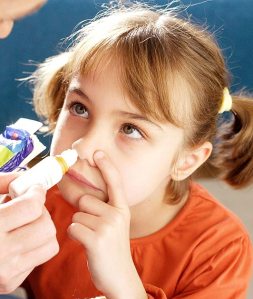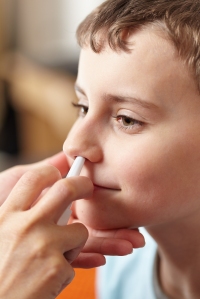When allergies strike, there are many options available for getting relief from the nasal congestion and itchy sinuses that cause discomfort. While the symptoms are similar to that of a cold, allergic rhinitis or hay fever can sometimes be a chronic problem that flares up throughout the year.
According to the American Academy of Asthma, Allergy & Immunology, allergic rhinitis affects between 10% and 30% of adults and as many as 40% of children.
Medical professionals may recommend medicated decongestants that come in the form of a tablet, liquid or even a nasal spray.

A saline nasal spray can help soothe irritated sinuses in children without concern about side effects from medicine.
The spray bottle tips are inserted in the each nostril and liquid is dispensed with a pump or squeeze of the bottle. The user then inhales the liquid and should soon feel their nasal passages opening up so that they can breathe better.
Non-medicated nasal saline sprays are often prescribed by medical professionals in order to cleanse the nasal passages of the dirt, pollen and irritants that cause discomfort. These rinses, usually comprised of purified water and salt, can be administered the same way and the irritants flushed from the nose providing relief.
Some saline nasal rinses have added natural ingredients which can help moisturize your sinuses or even provide a refreshing feeling. These saline sprays can be used without worry of addiction and can even be supplements to medication prescribed by your doctor.



